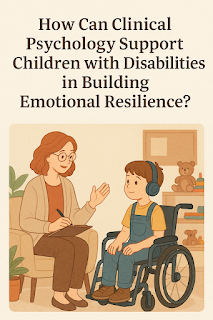How Can Clinical Psychology Support Children with Disabilities in Building Emotional Resilience?
Children with disabilities often face unique emotional challenges that can impact their development, relationships, and self-esteem. Clinical psychology offers powerful tools to help them navigate these challenges with strength and resilience.
At NeuroNest Collective, we believe that every child—regardless of ability—deserves compassionate psychological support tailored to their needs. Let’s explore how clinical psychology helps build emotional resilience in children with disabilities.
---
🌱 What Is Emotional Resilience?
Emotional resilience is the ability to recover from setbacks, cope with stress, and thrive despite adversity. For children with disabilities, this might include managing social isolation, communication barriers, physical limitations, or educational struggles.
Clinical psychology doesn’t aim to "fix" a child—it empowers them to adapt, cope, and build confidence in their identity and abilities.
---
🧩 How Clinical Psychologists Help
Clinical psychologists work with children through assessment, therapy, and family support. Here are some key areas where they make a difference:
1. Emotional Regulation Skills
Children learn how to identify and express emotions in healthy ways through:
Play therapy
Art-based expression
Cognitive-behavioral techniques
Storytelling and role-playing
2. Managing Anxiety and Depression
Children with disabilities may experience anxiety due to bullying, exclusion, or frequent medical interventions. Therapy helps reduce anxiety by:
Teaching coping strategies
Building social confidence
Creating a safe space for self-expression
3. Developing a Positive Self-Image
Many children struggle with internalized ableism or feeling "different." Psychologists help them:
Embrace their identity
Focus on strengths
Reframe negative thinking
---
🤝 The Role of Families and Caregivers
Family involvement is essential. Clinical psychologists often:
Coach parents on behavior strategies
Offer emotional support for caregivers
Help families create a nurturing, consistent environment
This teamwork approach helps children feel secure and supported across all settings.
---
🎓 Support in Schools
Psychologists also collaborate with:
Teachers and special educators
Occupational and speech therapists
School counselors
Together, they build Individualized Education Plans (IEPs) that prioritize both learning goals and emotional well-being.
---
💬 Voices from the Field
> “When my son started therapy, he was withdrawn and anxious. Today, he’s communicating more and smiling again.”
— Parent of a 6-year-old with autism
> “Our sessions are not about changing who the child is. They’re about helping them feel proud, connected, and resilient.”
— Dr. Rhea Thomas, Clinical Psychologist
---
🌈 A Message from NeuroNest
Emotional resilience isn't about avoiding struggle—it's about growing through it. Clinical psychology gives children with disabilities the tools to feel seen, heard, and strong.
If you’re a caregiver, teacher, or ally, your support makes a world of difference. Let’s work together to create a more emotionally inclusive world for every child.




Comments